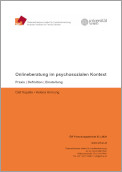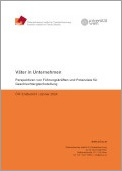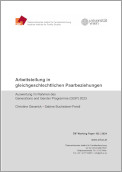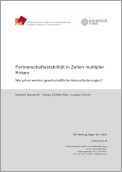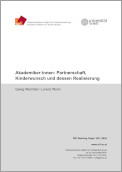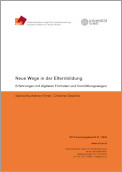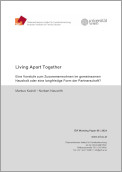Online Counselling in Psychosocial Context
Online Counselling in Psychosocial Context
Digital media have become an integral part of everyday life and have also pervaded the field of psychosocial counselling and therapy for many years. The focus of this study was to determine the status quo of the digitally supported counselling landscape in Austria. Specifically, the aim was to investigate how spread the online counselling setting is, how it is used and how professionals generally feel about online counselling.
Forschungsbericht 53 (PDF)
Fathers in Companies
Fathers in Companies
Using an online factorial survey, over 400 managers in Austria were asked to evaluate the parental leave and part-time work wishes of fictitious male employees. The results show a high potential for measures to support fathers and great openness towards the concerns of male employees. Starting points for realising this potential were identified.
Forschungsbericht 52 (PDF)
Reader survey on "beziehungsweise"
Reader survey on "beziehungsweise"
Since 1995, the ÖIF information service "beziehungsweise" has been providing up-to-date, scientifically based reports on the topic of family. The editorial team would like your feedback so that we can continue to provide you with the best possible information in the future. It takes about four minutes to answer the questions. Link to the survey
Division of Household Tasks in Same-Sex Relationships
Division of Household Tasks in Same-Sex Relationships
The study attempts to analyse why not only male-female couples, but also same-sex couples, do not share equally the "typically female" household chores, such as laundry, but often only one person is responsible for them. International data from the Generations and Gender Programme (GGP) was analysed. Just as with heterosexual couples, children, income, education and length of cohabitation play a role - but at a statistically insignificant level.
Working Paper 102 (PDF)
Partnership Stability in Times of Multiple Crises
Partnership Stability in Times of Multiple Crises
Partnerships appear to have become more volatile over the last few decades. This study shows the extent of the main factors influencing the individual tendency to break up, as identified by the recent survey wave of the Generations and Gender Programme (GGP) in Austria.
Working Paper 101 (PDF)
Academics: Partnership, Desire for Children and Realisation
Academics: Partnership, Desire for Children and Realisation
In Austria, people with an academic qualification have significantly fewer children than people with a lower level of formal education. When investigating the underlying causes, it becomes clear that there is a fundamental desire to have children, but that its realisation is considered rather unrealistic in medium term. Using multivariate regression models the contentment with the current partnership can be demonstrated as well as a negative influence of temporary employment on the subjective probability of realisation.
Working Paper 100 (PDF)
New Paths in Parent Education
New Paths in Parent Education
The aim of this study was to record the rich experience that has been gathered in recent years in parent education in regard of digital programmes, concepts and methods in a structured manner and to derive recommendations for the future practical integration of digital possibilities and access routes in parent education.
Forschungsbericht 51 (PDF)
Living Apart Together
Living Apart Together
The study analyses the relationships of couples who do not live together in the same household. It shows how satisfied the participants are with the relationship, why they are currently living separately, how often they meet and what their future family and partnership plans are.
Working Paper 99 (PDF)
Family Research on Twitter
Family Research on Twitter
The Austrian Institute of Family Research is now present on X. We provide regular news updates on current publications, research results and projects. We publish media reports about the Institute, invite you to events and report on the activities of the ÖIF staff.
Follow us: x.com/oif_univie

